![How To Create Meeting Minutes in Google Docs [Template + Example]](https://images.template.net/wp-content/uploads/2023/07/How-To-Make_Create-Meeting-Minutes-in-Google-Docs-Template-Example-788x443.png)
How To Create Meeting Minutes in Google Docs [Template + Example]
Meeting minutes Play a vital role in the recording of meeting information and details. In any kind of meeting, there is always…
Mar 30, 2023
Use case ideas for written documents should contain information that can be used to identify, clarify, and organize system requirements in software and describe how an actor uses a system to accomplish his task. It is written by business analysts and can be employed during several stages of software development.
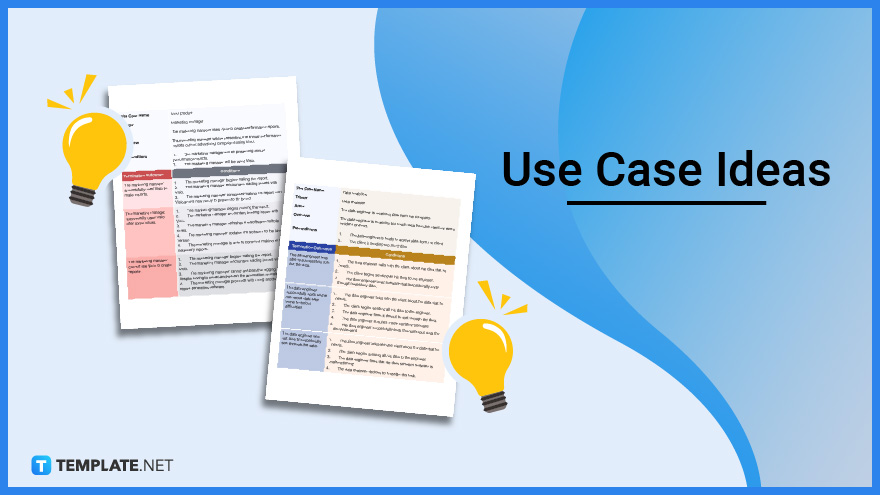
A use case idea for templates includes information about the system, actors, use case descriptions, and their relationships. These elements can be arranged in a form of a diagram that can visually display the connections between them. A business or company utilizes a use case to manage its scope, establish requirements, and visualize system architecture.
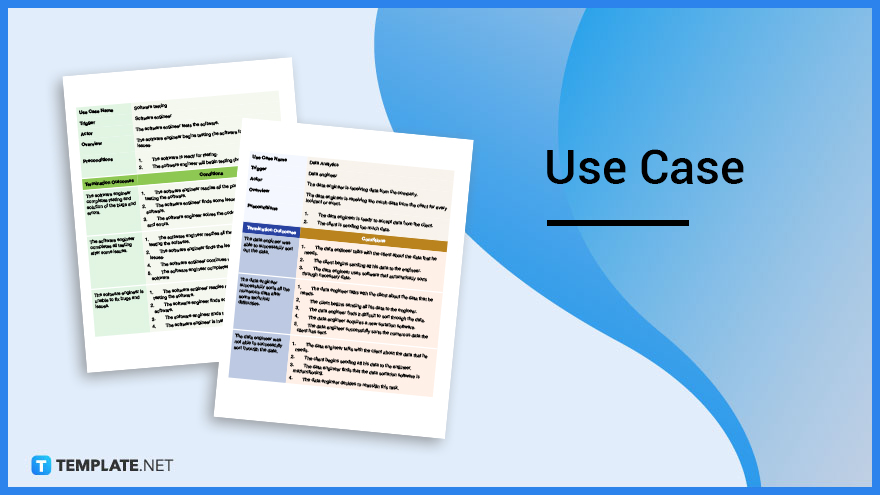
Functional use cases contain functional requirements that define the functionality of a system being developed. They are mostly in text form that can be used as unit test cases. It contains the use case name, trigger, actor, overview, preconditions, termination outcomes, and conditions.
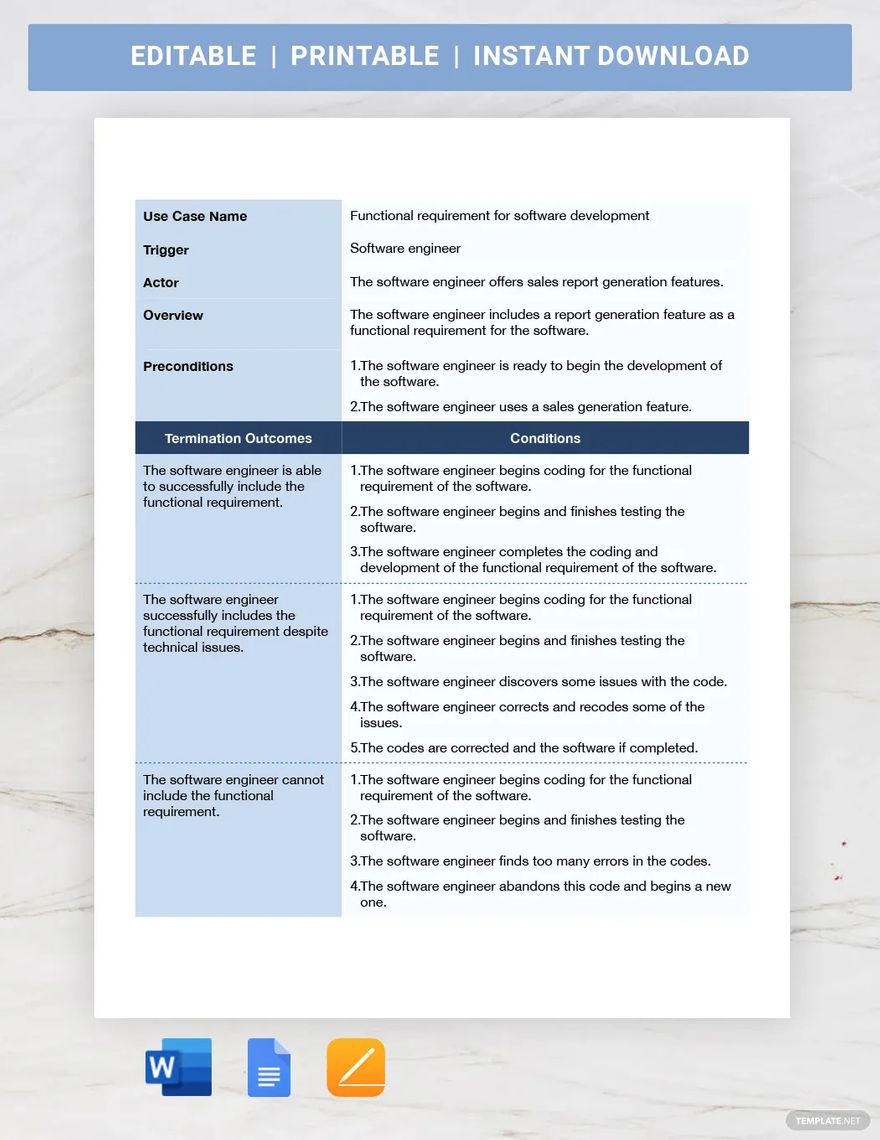
A data analytics use case is a scenario in which a business user utilizes data and analytics systems to gain insights. Any industry can use this type of use case, including banking, accounting, agriculture, automotive, business and management, and more. It can be utilized for customer sentiment analysis, behavioral analytics, customer segmentation, predictive support, and fraud detection.
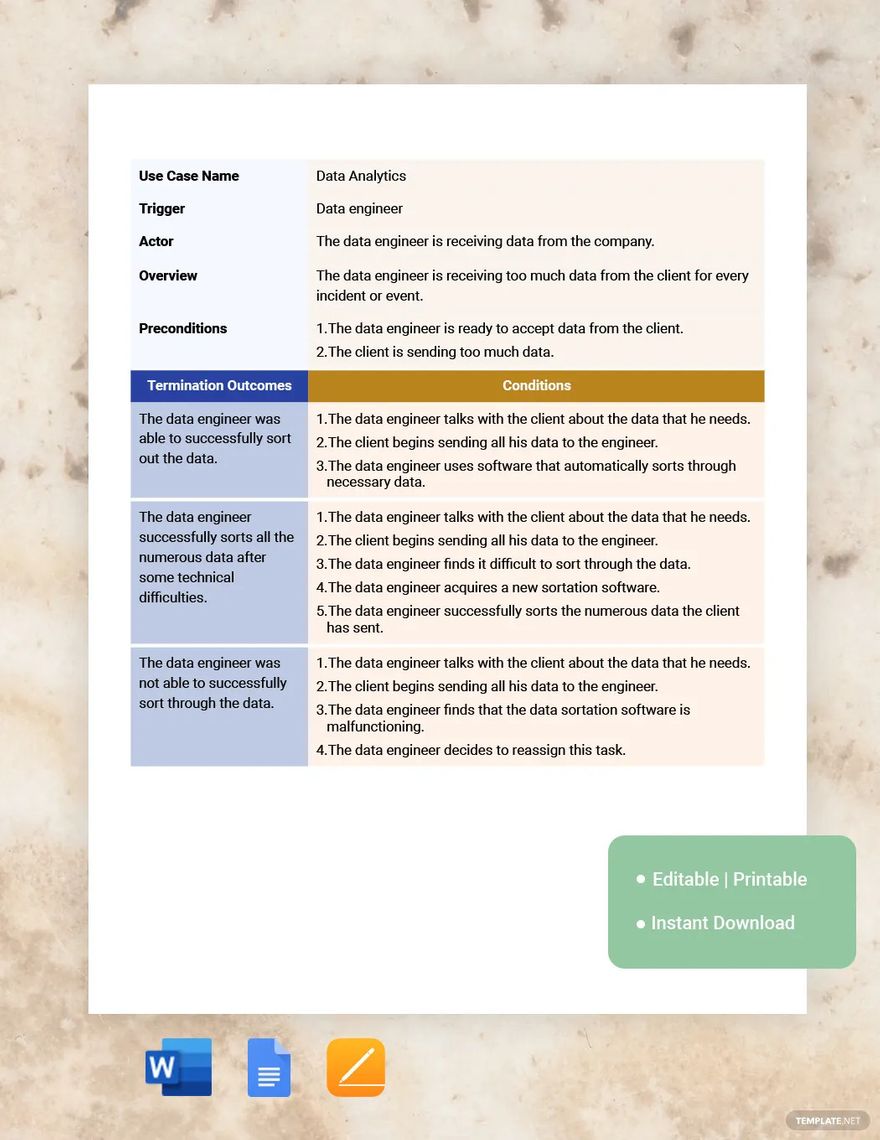
Vision use cases summarize how users or actors interact with a system like software applications. Visio is used on PCs or mobile devices to visually organize complex ideas using diagrams. It includes details on how marketing personnel uses the Visio application for their tasks.
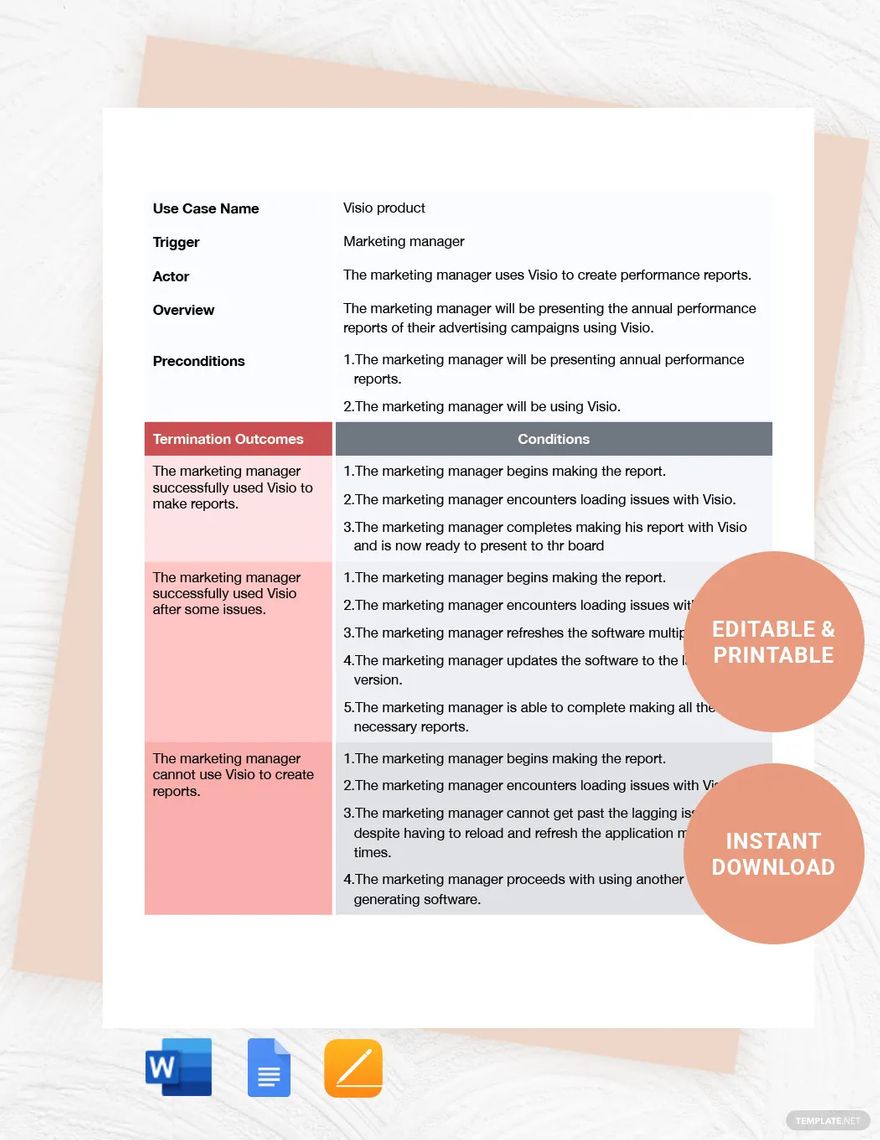
A project use case is used to establish project requirements, manage its scope, outline the ways a user will interact with the system, and manage risks. This use case includes a set of possible scenarios of interaction between the user and the system. It details how a project should be conducted including the conditions needed to ensure its success.
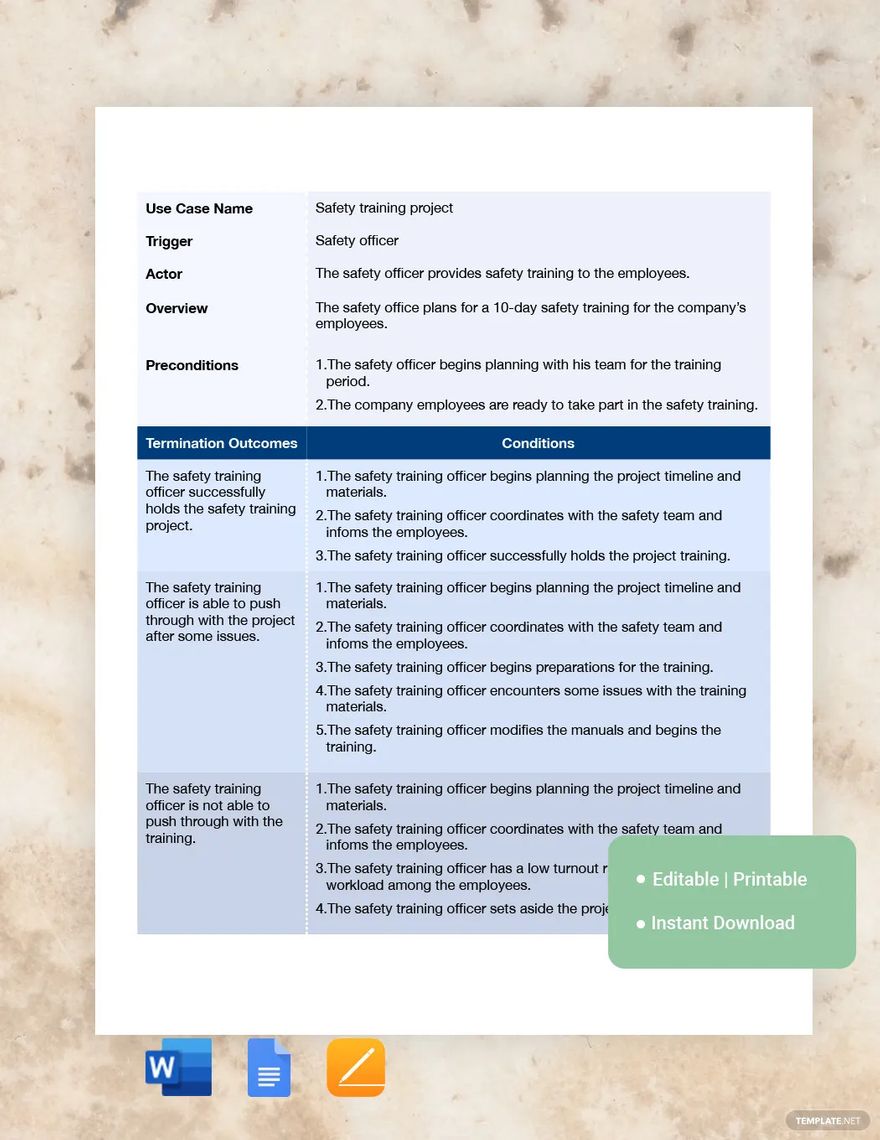
App use cases are used to identify the benefits of app development. App use cases can be for collaboration and conferencing, scheduling, asset management, sale quotes, catalog and pricing, CRM, and more. Utilizing app use cases provides a list of goals to help in establishing the cost and complexity of an app.
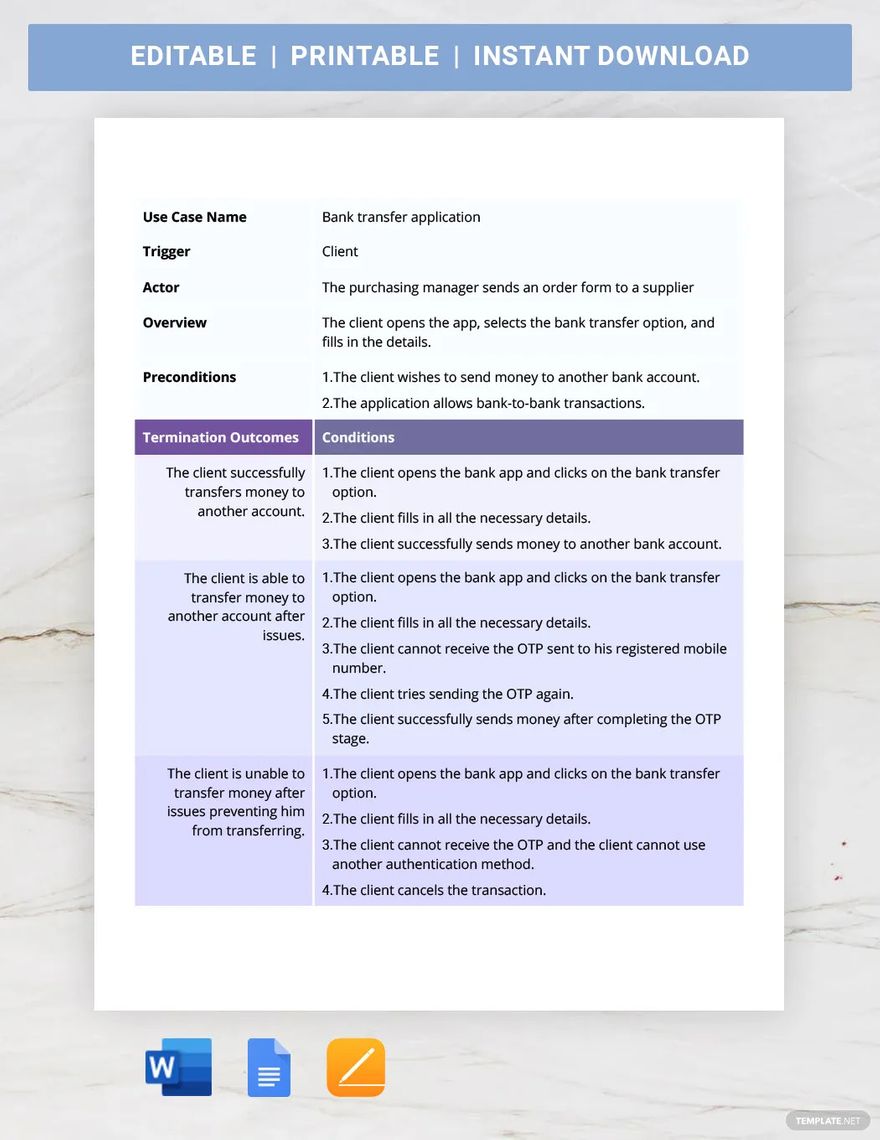
Agile use cases are used to capture a user’s point of view while describing the functional requirements of the system. It defines each process a user goes through to accomplish a goal using the software system. It also captures the negative aspects that a user may experience that prevent them from achieving their goal.
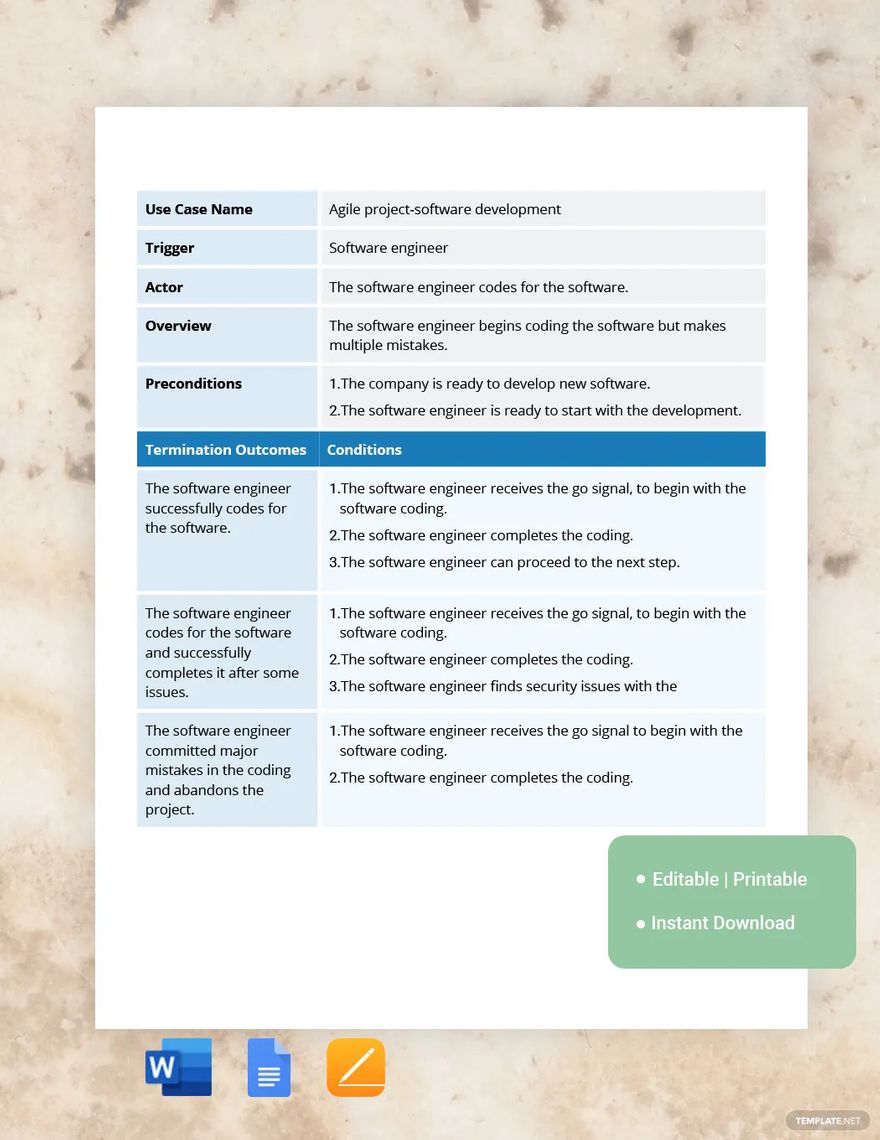
Test use cases are brief descriptions of certain functionality of the software application by an actor or user. It helps in identifying test cases that use the whole system on a transaction-by-transaction basis from start to finish. It also helps in identifying gaps in the system which can not be found by testing individual components.
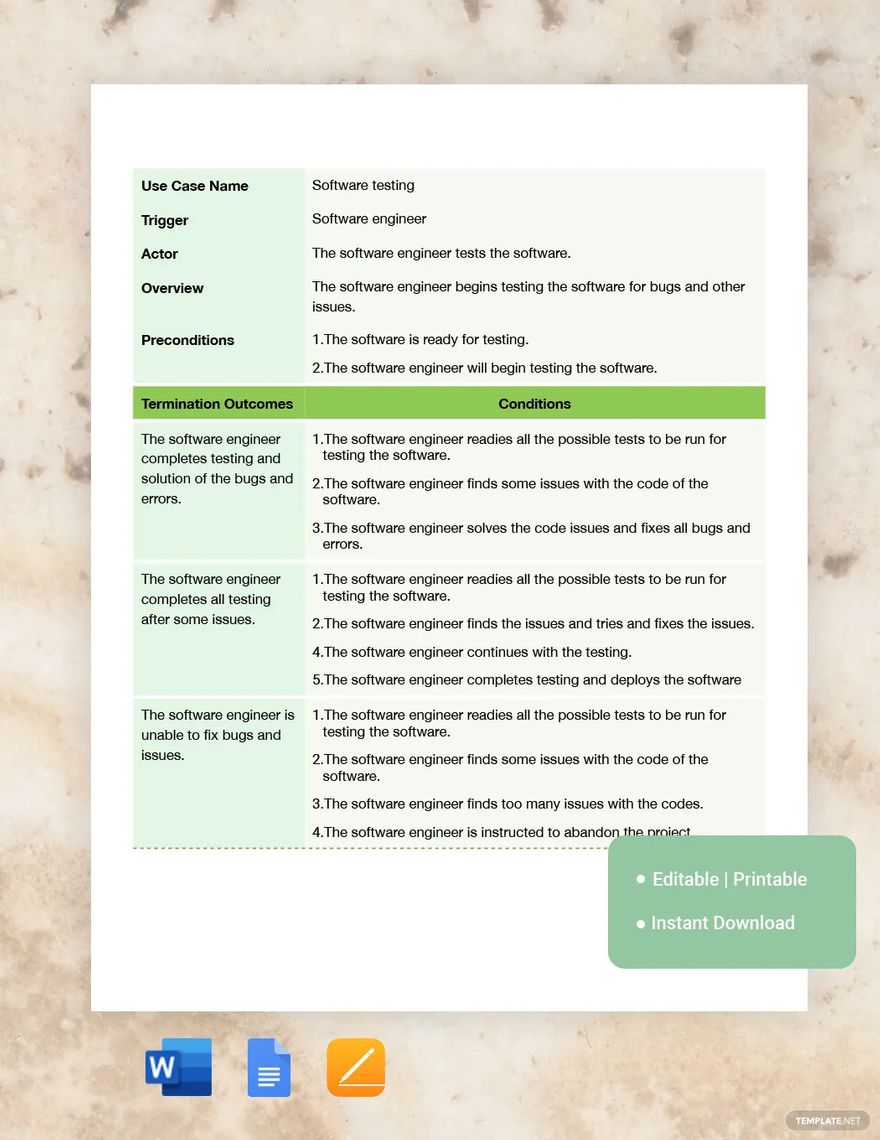
A blank use case is a blank downloadable template that an individual can use to freely add details as they seem fit. It can be enhanced by adding various shapes like a box or circle and lines to connect users and systems. It can be used for a presentation of machines, networks, management, and other kinds of chain systems.
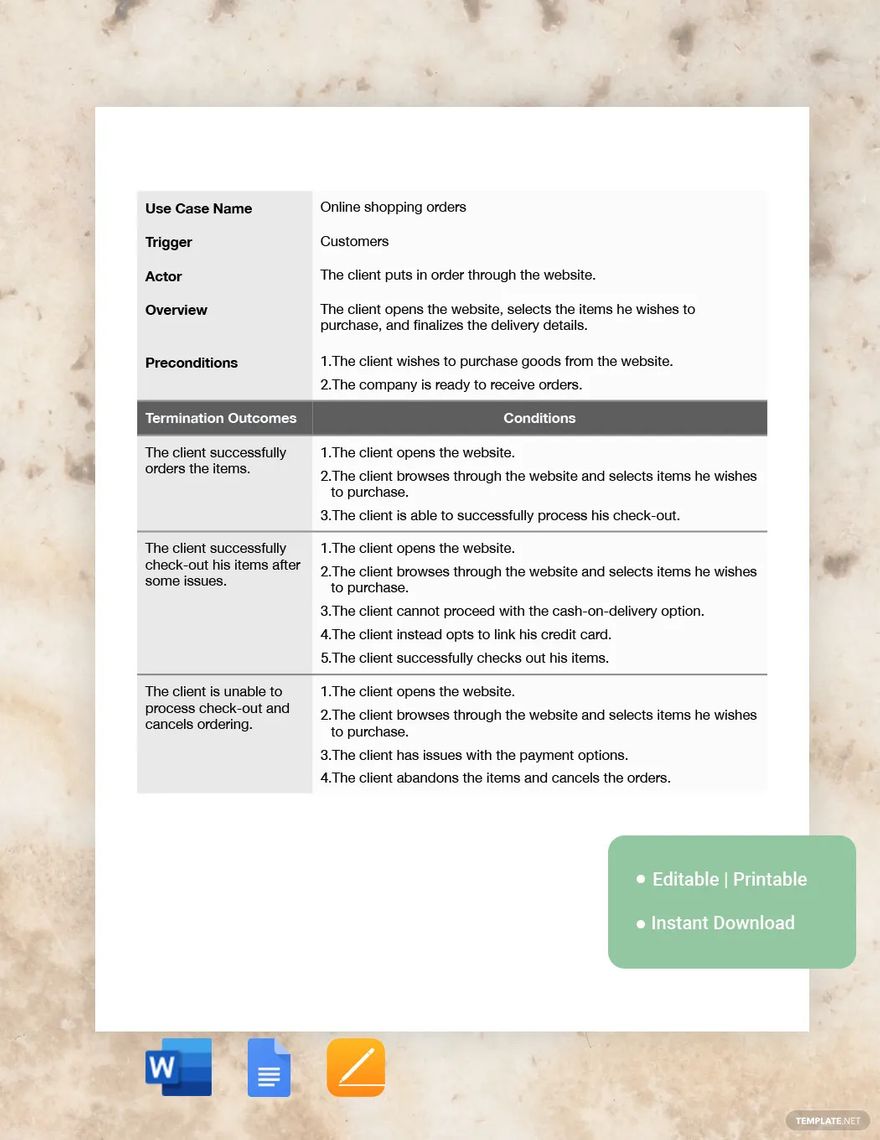
Modern use cases include the blockchain, private clouds, machine learning, big data analytics, and application modernization. It contains an overview of the use case, the actors, preconditions, and conditions. It also includes the termination outcome which is a list of successful and unsuccessful ways a use case can end.
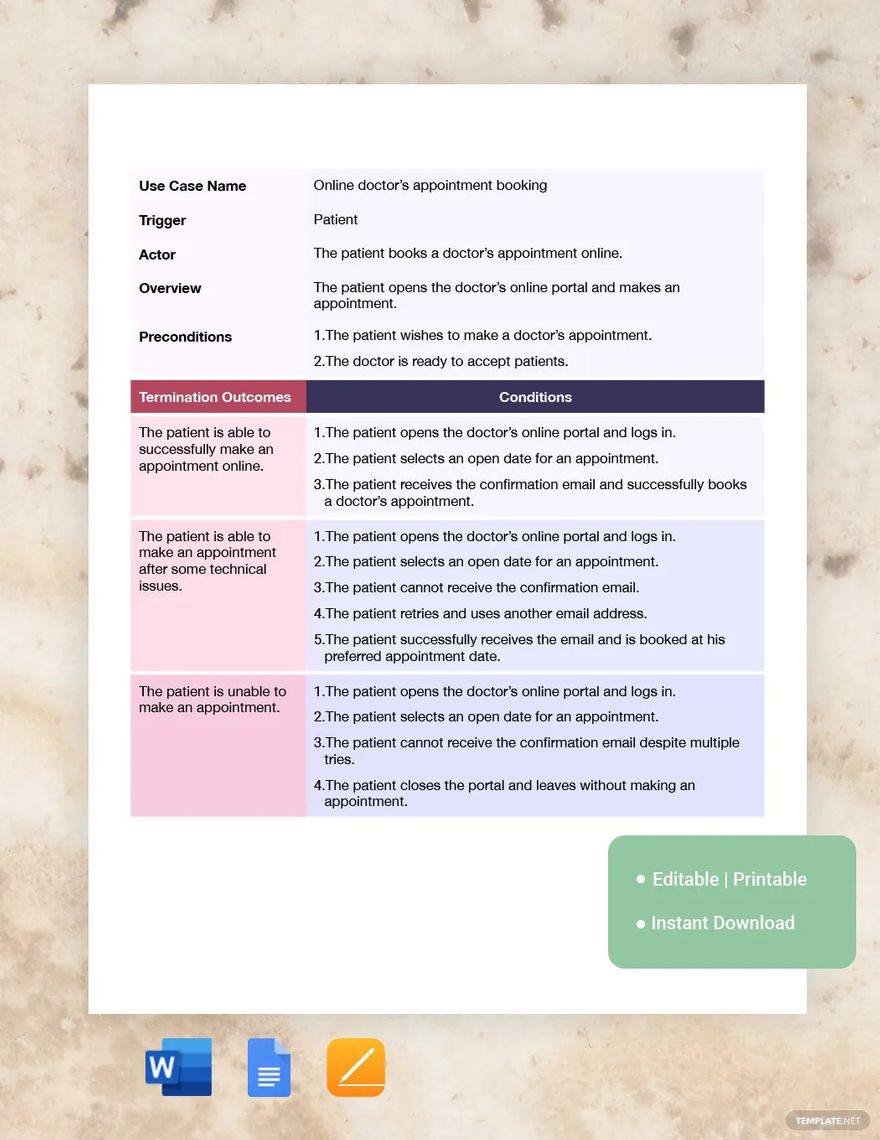
A formal use case is a tool used to collect structured information about how users will use the software. Formal use cases have a specific structure to represent the information it contains. It helps in the easier estimation of the cost of implementation, thorough coverage of the use case, and easy-to-understand document structure.
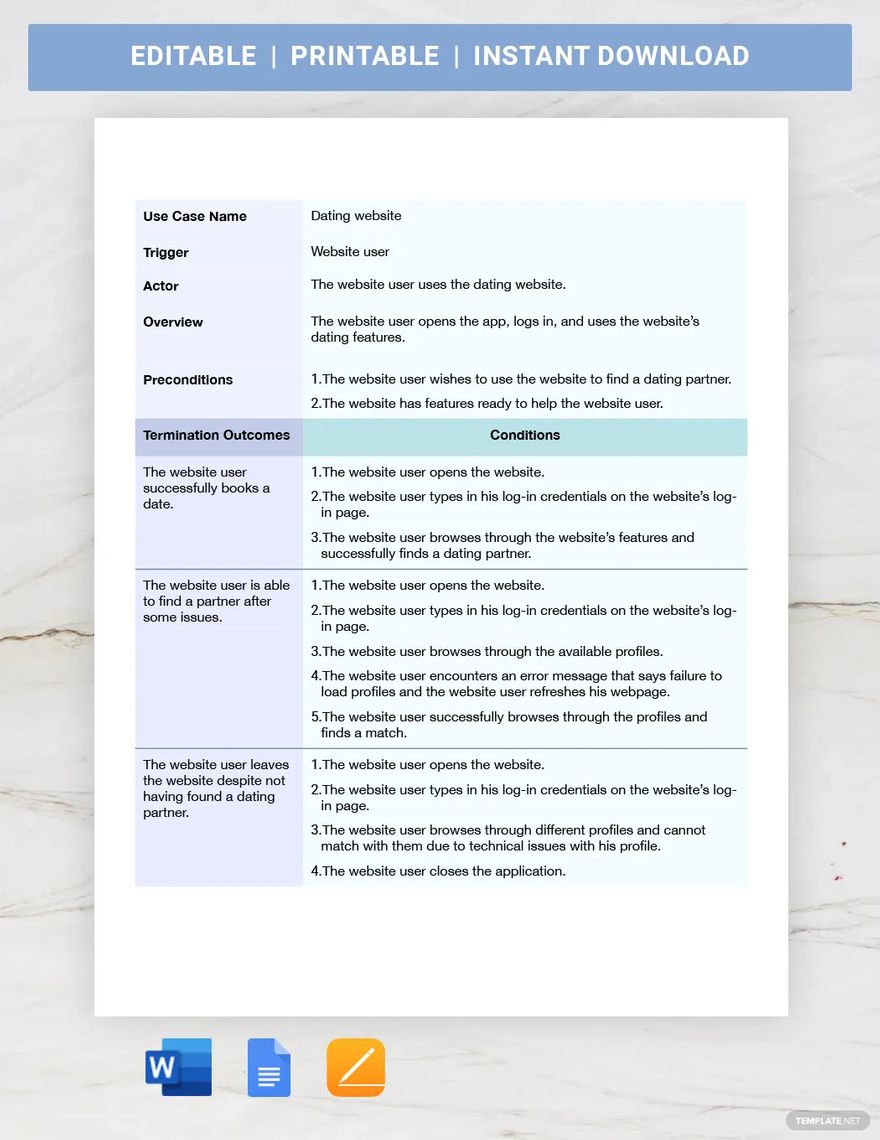
A use case contains three basic elements which are the Actor (a person or group of people), the Goal (the final successful outcome that completes the process), and the System (which can be referred to as a scenario).
To write a use case for functionality, identify first who is the target audience, define their goals, decide the normal course of action for each, and describe the basic course in the use case description.
Use cases provide a structure for gathering customer requirements and setting and managing the project scope which is useful to test a system as it’s being developed, leading to a quicker development and more usable system.
An actor is represented with a stick figure and their participation in the system is modeled with a line between the actor and the use case.
Use case testing helps in understanding the requirements of a system by providing a sequence of steps that describes the interaction between a user and the system.
Use cases help in explaining how a system should function while allowing developers to identify errors during the process.
To create a use case in marketing, ask your prospect about the goals they want to achieve and problems they want to solve, present the use case using the client’s perspective, use diagrams to visually present the use case, and a summary of the case from the prospect’s point of view.
Use case in product development refers to a scenario that shows how a product’s user will interact with the product to accomplish their tasks.
Customer use cases describe all possible scenarios in which a user and the system would interact with each other to achieve the user’s goal.
Use case in sales is a study that enables enhanced deal closing ratio which makes them a valuable addition to an individual’s enablement library.
To build a business use case, identify the Actors and the Goal, define the Pre-conditions and Post-conditions, describe the main flow and exceptions, and describe the alternate flows.
Use cases in software development refer to a list of actions or steps of events that defines the interaction between a role and a system to achieve a task.
![How To Create Meeting Minutes in Google Docs [Template + Example]](https://images.template.net/wp-content/uploads/2023/07/How-To-Make_Create-Meeting-Minutes-in-Google-Docs-Template-Example-788x443.png)
Meeting minutes Play a vital role in the recording of meeting information and details. In any kind of meeting, there is always…
![How To Make/Create a Manual in Google Docs [Templates + Examples] 2023](https://images.template.net/wp-content/uploads/2023/07/How-To-Make-Create-a-Manual-in-Google-Docs-788x443.png)
Manuals are essential instructional and reference guides. They help direct and inform an individual’s actions and also explain how to…
![How To Make/Create a Manual in Microsoft Word [Templates + Examples] 2023](https://images.template.net/wp-content/uploads/2023/07/How-To-Make-Create-a-Manual-in-Microsoft-Word-788x443.png)
Creating a manual can be a time-consuming and tedious task. However, manuals and other reference guides are necessary for organizations…
![How To Create a Legal Document in Google Docs [Template + Example]](https://images.template.net/wp-content/uploads/2023/07/How-To-Make_Create-a-Legal-Document-in-Google-Docs-Template-Example-2023-788x443.png)
When creating a legal document, there are a lot of things a person has to consider, and one of which is the…
![How To Make/Create a Contract in Microsoft Word [Template + Example] 2023](https://images.template.net/wp-content/uploads/2023/07/How-To-Make_Create-a-Contract-in-Microsoft-Word-Template-Example-2023-1-788x443.png)
Contracts can come in different forms and for different reasons but the most common thing is that when a company does business with…
![How To Create a Contract in Google Docs [Template + Example]](https://images.template.net/wp-content/uploads/2023/07/How-To-Make_Create-a-Contract-in-Google-Docs-Template-Example-2023-Step-788x443.png)
Contracts are an important part of any company or business, especially those that work with different companies or businesses. Companies…
![How To Make/Create a Report in Google Docs [Templates + Examples] 2023](https://images.template.net/wp-content/uploads/2023/07/How-To-Create-a-Report-in-Microsoft-Word-788x443.png)
A report is a comprehensive document that covers a wide array of topics from finance, research, incidents, feasibility studies, and…
![How To Make/Create a Report in Microsoft Word [Templates + Examples] 2023](https://images.template.net/wp-content/uploads/2023/07/How-To-Make_Create-a-Report-in-Microsoft-Word-Templates-Examples-20232-788x443.png)
A report is a document that contains information, data, analysis, finding, and other relevant information based on a specific topic.…
![How to Make/Create a Notebook in Google Docs [Templates + Examples] 2023](https://images.template.net/wp-content/uploads/2023/07/How-to-Make_Create-a-Notebook-in-Google-Docs-Templates-Examples-2023-788x443.png)
Notebooks always come in handy in writing important information or expressing our thoughts through written words. When we need a…